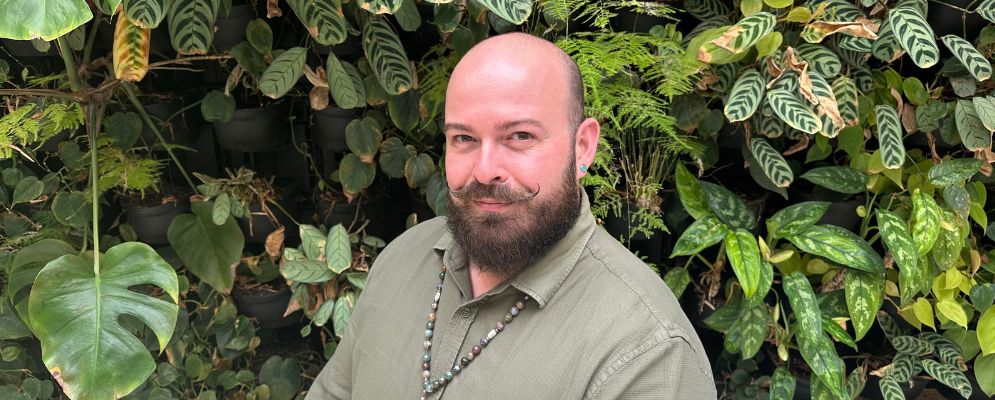For this month’s portrait, we had the pleasure of meeting Fausto Feroldi, an Italian from Sardinia who has built an impressive career in the restaurant industry in Luxembourg, while also perfecting his skills in crochet. Since May 2024, he has been the manager of Brasserie Schou. In just four months, he has significantly contributed to transforming the establishment into a popular and welcoming spot, while fostering a cohesive team.
A passion born in Sardinia and exported to Luxembourg
Fausto's passion for catering was ignited in a small town in Sardinia. As a teenager, around the age of 15, he started out in this field, without knowing that he would make a career out of it.
After high school, he began studying psychology at university but had to quit for personal reasons. Seeking new professional horizons, he decided to work for a season in the catering industry, which opened his eyes to his vocation. He found the psychological aspect of the job particularly intriguing. He then completed his academic path with two years at a private hotel school in Italy, gaining solid training in the field.
In 2009, after leaving his homeland for London, and thanks to a solid network and word-of-mouth, an opportunity arose in Luxembourg. Without hesitation, Fausto accepted and continued his adventure in the Grand Duchy.
What immediately attracted him to Luxembourg was its cultural and linguistic diversity. Passionate about languages, he speaks fluently Italian, French, Spanish, Portuguese, English and many others. “Luxembourg is like a small village with the stress of a big city. I liked that contrast”, he says. He also mentions the country's impressive range of career opportunities.
Human connection at the heart of the catering industry
“The relationship with others in the restaurant business is a really important value”, says Fausto.
These days, human contact is becoming increasingly rare in this sector, a field that is founded on human relations and direct interaction with customers. Too often, the profession is seen as a series of mechanical tasks, limited to serving food or clearing tables. This reductive view obscures the true richness of this profession, which lies in the ability to create memorable experiences for customers and forge quality relationships.
“It's a very difficult job. People think we just bring plates and don't know what to do with our lives. LOL But that's not it at all, it's a job you have to love.”
To excel in this industry, it's not enough to know the technical gestures. One must first love what they do and be ready to invest fully, as every detail counts in providing professional service.
The skills and experience required vary depending on the position, but the journey often starts behind the bar, where one learns the fundamentals of the job, by observing, listening to colleagues’ advice and practising. The industry offers many opportunities for advancement, whether by rising through the ranks from head waiter to manager or by developing specialisations.
As a manager, Fausto embodies this versatility. He juggles numerous tasks daily, from managing staff to overseeing orders, all while ensuring the overall smooth operation of the establishment. For him, every aspect of his job is as exciting as it is essential, and it is this rigour, combined with his ambition, that has enabled him to transform Brasserie Schou into a place with a warm and welcoming atmosphere. Fausto attaches great importance to the happiness of his staff and coworkers, convinced that their well-being is key to the establishment’s success. He knows that a cohesive, motivated, and valued team is essential for delivering exceptional service and maintaining the restaurant’s reputation.
A crisis in the HORECA sector?
Many restaurants are closing their doors, but is this really a crisis?
According to Fausto, it is not. It's true that the pandemic has encouraged people to cook at home and control their spending. Restaurants now need to offer better value for money, as customers have become more demanding. When it comes to recruitment, the situation is more complex. The sense of sacrifice and investment has changed.
“The new generations don't realise what they could become if they made just a little more sacrifice. The fault lies not with them, but with society, which is also changing”, he explains.
Education and schools have changed a lot over the years. These days, young people approach the job market with a different perspective: from their first interview, they don't hesitate to ask questions about salary, the number of days off and other practical aspects of the job. This reflects a wider shift in society, where priorities and ways of thinking about work have changed considerably.
“When I was a kid, if I wanted an extra €10, I had to clean the car. Today, if a child wants €10, his father will give him €20.”
Wait what? A man who crochets??
Fausto’s passion for crochet dates to when he was 20, during his civil service in Italy. Working in a school with disabled children, he was introduced to crochet by the cleaning ladies around him. Although his family had always practiced knitting and sewing, Fausto had never tried his hand at it. After setting aside knitting for a while, one day his aunt challenged him to make a scarf. She wasn’t convinced he would succeed, but thanks to his determination, he took up the challenge and then returned to knitting. This activity became a true passion, offering him relaxation and an escape. Encouraged by his friends, he ventured into social media, where he found an audience and new opportunities. In the future, he plans to create his own workshop, teach classes, and even launch his own crochet collection.

Thanks to his perseverance, Fausto has managed to build a solid career while forging a network. His journey, fueled by his various passions, perfectly illustrates Stendhal’s words: “Vocation is having one’s passion as a profession” (translated from French).
Find all job offers in the catering industry on Moovijob.com




